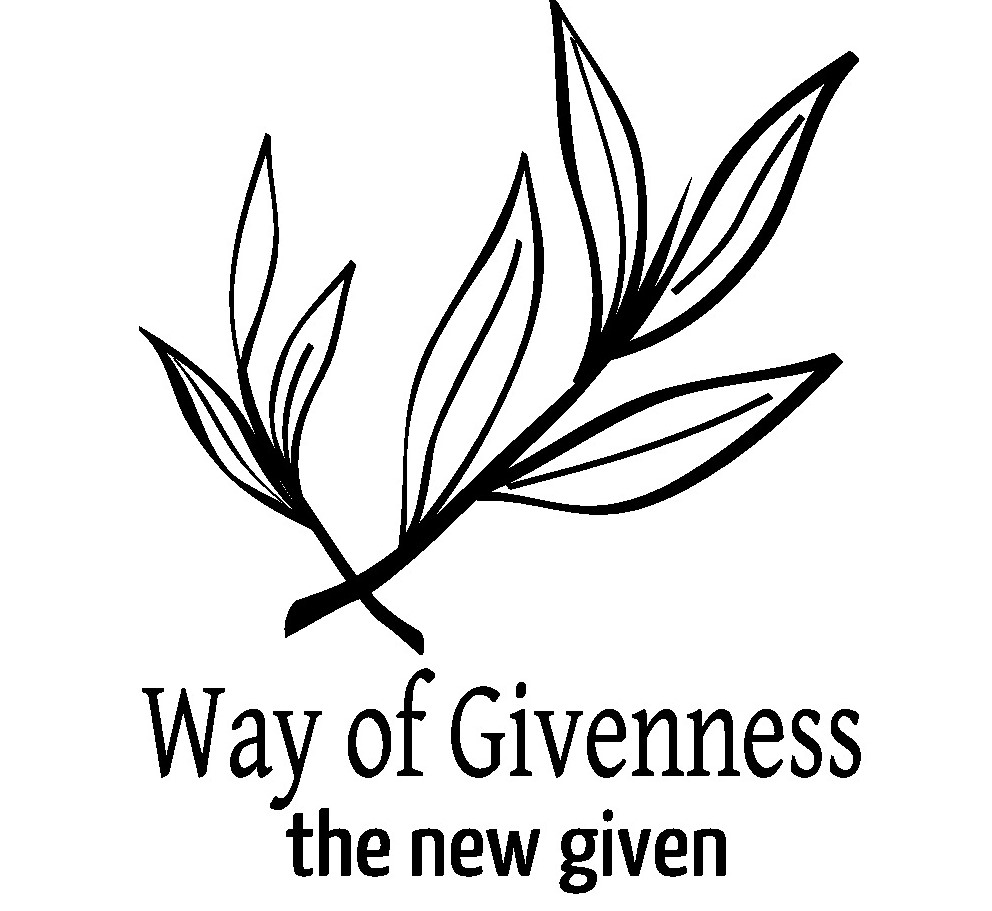- Home
- Daily Meditation
Praise, Renown, and Glory
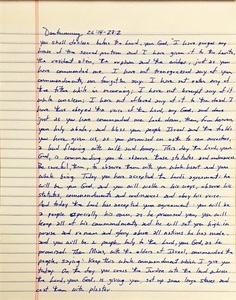
Deuteronomy 26:14-27:2
Synopsis Deuteronomy 26:14-27:2 3/15/2018
Moses led the people to accept of the covenant. He reminded them to observe all its precepts with whole hearts and whole beings. He also informed them that God had accepted their agreement. As a result, they could expect the blessings already mentioned in addition to praise, renown and glory from the nations.
Praise, Renown, and Glory
“…you will keep all of his commandments, and he will set you high in praise and renown and glory above all the nations he has made.”
It’s a promise that anticipates the praise of the nations. Moses anticipated that other nations would one day say of Israel, “For what great nation is there that has gods so close to it as the LORD, our God, is to us whenever we call upon him? Or what great nation has statutes and ordinances that are as just as this whole law which I am setting before you today?”
If it was embraced wholly, the lived covenant would surely draw attention. It was always supposed to. Being the “Chosen People” meant that they were chosen to mediate between the people of the world and the God of Creation. This kind of mediation first happens through the giving of an example. It wasn’t esteem for the words of the law that Moses anticipated.
Only lives lived have the power to evoke the recognition of glory.
Lives Lived
For Christ followers, the spiritual journey is a quest. It is a way of givenness. We receive and respond to a wisdom – not of our own making. It’s a pure and authentic following.
When Moses encouraged the Israelites to live out the law with their “whole heart and whole being”, he was challenging them to willingly embrace this new way of life. Anything less, he anticipated, would be perceived as a worthless pretense.
“I urge you therefore, brothers, by the mercies of God, to offer your bodies as a living sacrifice, holy and pleasing to God, your spiritual worship.” Rom 12:1
Rite and Remembrance
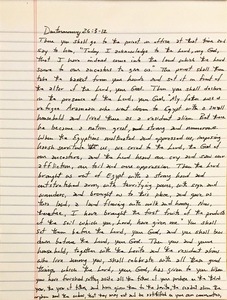
Deuteronomy 26:3-12
Synopsis Deuteronomy 26:3-12 3/14/2018
Moses directed the children of Israel to conduct a offering rite as thanksgiving for the harvest.
Rite and Remembrance
It wasn’t enough to simply give the tithe. The tithe wasn’t intended to be a payment. It was intended to be a gift that proceeded from the overflow of the heart and the abundance of the harvest. So, the gift was given in the context of remembrance.
Reciting this brief history was a part of giving rite. Sharing the offering of first fruits with the local Levites and the resident aliens was a microcosm of what the experiment in Authentic Community was always supposed to be.
The mark of Authentic Community is universal sharing in the goods of the earth. Acceptance and sharing – remembering that all good comes from God.
The overt act of remembering keeps the community grounded in this foundational reality.
“You are being enriched in every way for all generosity, which through us produces thanksgiving to God” 2Cor 9:11
Standards, Equity and Justice
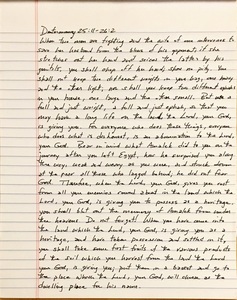
Deuteronomy 25:11-26:2
Synopsis Deuteronomy 25:11-26:2 3/13/2018
Moses made decrees concerning the need to use fair weights and measures. He also demanded that Israel repay Amalek for mistreating the Israelites during the exodus from Egypt. He established a curious rule concerning a wife who intervenes should her husband become involved in a fight. Finally he established the requirement to give the first fruits of produce from the land as an offering to the Lord in the place God established for the tabernacle in the Promised Land.
Standards, Equity and Justice
It’s the double standard. It’s the disposition to take advantage of the other. I want to get a little more value than I’m due – to give a little less than I owe. Entitlement. Self-justification. Looking out for number 1. It all comes pretty naturally.
But God seems to hate it. It’s not love. It’s not His nature.
His passion is for equity. His eyes search for a heart trained to recognize value at its core. Who will see and respond to the deepest value? Who will perceive the immeasurable value invested in the being of the most ordinary man – this is the ultimate mark of a child of God. Recognizing this is true justice. Seeing the other is the beginning of authentic love.
The apostle observed that the whole of creation awaits in eager anticipation for the revealing: Who will live like this? Who will be a child of God?
“Varying weights, varying measures, are both an abomination to the LORD.” Prov 20:10
On Human Dignity
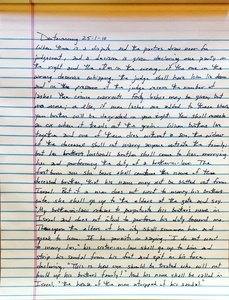
Deuteronomy 25:1-10
Synopsis Deuteronomy 25:1-10 3/12/2018
Moses commanded the children of Israel: Do not whip a man with more than 40 lashes. Do not muzzle an ox that is used for threshing grain. Brothers must protect the legacy of deceased brothers by building up their line.
On Human Dignity
Although some of the Mosaic laws seem strange and deeply archaic, the essential motivation of the law of Moses is designed to recognize the dignity of every human person. They are designed to respect the actual, intrinsic value of ordinary things.
Over-punishment is a cruelty that fails to recognize the intrinsic value of each human person. Refusing to support widows and orphans similarly fails to respect and love the life of a brother.
Authenticity and I-Thou
On the one hand, progressive social contract communities like to imagine that humans have had great success in making a world that is more humane, less vicious and more tolerant. And perhaps there is something to this advance.
On the other hand, legislation that defines legally accepted behaviors through enforced constraint doesn’t really get to the heart of the issue. It may be that we’ve written out of the social contract “death by stoning”. But is that the same as “love your neighbor”?
I-Thou. I see you as I see myself. I see in you what I see in myself. I see in you the Christ that I see in myself.
What law will bring me to live like that? That’s the question.
“When Jesus saw her weeping and the Jews who had come with her weeping, he became perturbed and deeply troubled” John 11:33
Authentic Community Gives to Refugees
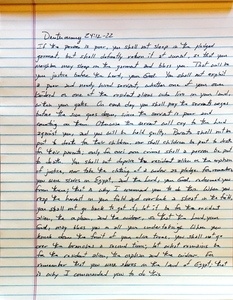
Deuteronomy 24:12-22
Synopsis Deuteronomy 24:12-22 3/11/2018
Moses taught the Israelites; For a lender, treating the indebted poor with respect is just. Similarly, an employer must not hold wages overnight since the poor laborer needs the daily wages to survive. Additionally, Israelites were directed to leave the corners and forgotten sheaves and secondary harvests of fruit trees for the resident alien, orphan and widows to harvest.
A note on capital punishment included the admonition that parents were not to be punished for their children’s behavior nor children for the parent’s.
Authentic Community Gives to Refugees
With these laws, poor people from all over the world would be attracted to Israel. The Israel that Moses envisioned would draw refugees. Because it was a refuge for escaped slaves from other countries and because its laws made provision for the poor and needy, many would want to come. In Israel, the poor could eat from the field and the vineyard without price. In the harvest, farmer’s were encouraged not to harvest the corners of the field and admonished not to go back and retrieve forgotten sheaves.
“That will be your justice before the Lord, your God.”
This is a curious thought from Moses. My personal measure of justice is revealed in how well I treat poor people. The measure of a community’s justice is revealed by how well the poor are treated in general. So, the willingness of the poor to bless the citizens of a community is the measure of the justice of the community.
God’s way of thinking has this certain quality of the radically obvious.
“This poor one cried out and the LORD heard, and from all his distress he saved him.” Psalms 34:7
Right Relationships
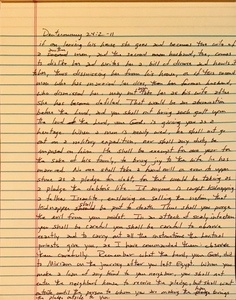
Deuteronomy 24:2-11
Synopsis Deuteronomy 24:2-11 3/10/2018
Moses commanded the Israelites concerning a variety of issues. Concerning relationships; a man and woman cannot remarry after divorce if the woman has married someone else in the meantime. A newly wed man cannot be compelled to serve in the military for one year.
In lending, Moses commanded that a lender cannot take as pledge some essential piece of equipment – like a handmill or a cloak. Also, a lender cannot enter the house of a debtor in order to collect a pledge. He reminded the Israelites to follow the instructions of the priests in all matters of disease – especially skin disease.
Right Relationships
People are not objects. Moses’ commands show that God doesn’t accept an attitude that objectifies the other person. So, it is inappropriate to take back a divorced wife who has married another. This turns her into a commodity.
Similarly, a lender must remain outside the house of a debtor to collect the pledge. The debt does not make the indebted person less worthy of respect. And the debt does not justify taking as a pledge what is life-essential for a person to survive.
Love Your Neighbor as Yourself
I suspect that most people share in the intuition that they are made in the image of God – that they are created with a certain interiority, with an independent will and with some creative capacity.
I experience life this way.
The challenge of relationship is in recognizing this same divine reflection in others. Do I see you as a means to my ends – a way of getting what I want? An object.
Or do I see you as a person “like me”, Imago Dei.
So this is the relational call of Christ. To not see the other as a person is a deep and persistent failure. It is a chosen blindness.
“If anyone says, “I love God,” but hates his brother, he is a liar; for whoever does not love a brother whom he has seen cannot love God, whom he has not seen.” 1John 4:20
Sharing in the Authentic Community
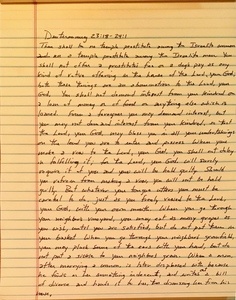
Deuteronomy 23:18-24:1
Synopsis Deuteronomy 23:18-24:1 3/9/2018
Moses commanded that the children of Israel could not charge usury on money loaned to kindred. He allowed that usury could be charged to foreigners.
He also observed that when people make vows before the Lord God, that they must promptly fulfill their vows. Failure to fulfill vows was a cause for breach between the individual and God – one that God would punish. Moses also observed that no one was required to make a vow.
According to the command of Moses, Israelites were free to eat from the vineyards and grain fields of their neighbors without any special permission as long as they did not harvest and retain the food. They could only eat what they collected while at the field.
Sharing in the Authentic Community
Moses was demanding that the Israelites remain in absolute fraternity. This was the kind of sharing one might give with a beloved brother or sister – No counting the cost.
But there were 600,000 men Israel. How could anyone open themselves to sharing the fruit of their labor with so many? How could a reasonable person expose themselves in this way? They (the kindred) might eat everything. They might want to borrow what’s left. Who could take such a risk? How could anyone be this free?
Jesus’ Challenge
And then Jesus came. He ate from the field with unwashed hands but stored no grain. He accepted what He was given without looking to create a reserve. He received without inhibition and gave freely whatever He had.
And He said, “Do not worry about your life.”
And yet I still look in horrified wonder and amazement. I want to say, “and who is my brother?” But I know how He will respond.
There’s no way around Jesus’ love for the Authentic Community. He requires an absolute commitment.
“They devoted themselves to the teaching of the apostles and to the communal life, to the breaking of the bread and to the prayers” Acts 2:42
Freed Slaves
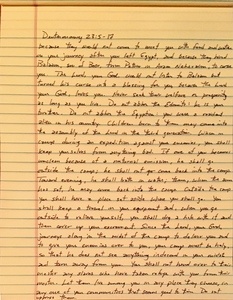
Deuteronomy 23:5-17
Synopsis Deuteronomy 23:5-17 3/7/2018
Moses commanded that people from Moab and Midian should not be accepted into the Lord’s assembly to the 10th generation. Alternatively people from Edom could join the assembly of the Lord in the 3rd generation.
He also gave commands concerning camp cleanliness during expeditions. Interestingly, he commanded that escaped slaves who fled to Israel should not be returned to their masters.
Freed Slaves
No human person was born to be a slave. So it comes as little surprise, even in the midst of a world steeped in the tradition of enslavement, that all of Israel would be a sanctuary and refuge for escaped slaves.
Moses reminded the people that they were themselves, escaped slaves. It was fitting that he commanded that these people should be welcomed as refugees. They were granted the right to settle anywhere in Israel as resident aliens.
God’s Chosen People
God’s chosen people were themselves escaped slaves. Their slavery wasn’t essential to their nature but it was a part of their experience – both individually and communally. They were slaves individually. But they were also a community of slaves – an entire race enslaved.
God chose the Israelites and called them out of slavery. He called them to be a separate, chosen people. They were called out of slavery to be a nation of kings and priests to mediate between the God of Creation and the people of the world. He called them to freedom in order to serve Him.
Calling all slaves wherever you may be – The call of Christ is for anyone who can hear it.
Though enslavement is not an essential quality of any human person, we have all known slavery. We have all sinned.
I am not called because of my own goodness or righteousness. I am not attractive because of my personal history nor because of the decisions I’ve made. And there is nothing I could do to undo the marks of my slavery.
Yet, for those who are called, each is called in this way – out of slavery. And from this, we are called into the freedom to serve the one, true God of all Creation.
“For freedom Christ set us free; so stand firm and do not submit again to the yoke of slavery.” Gal 5:1
Purity
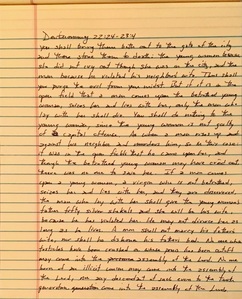
Deuteronomy 22:24-23:4
Synopsis Deuteronomy 22:24-23:4 3/7/2018
In the case that a man violates a woman who is betrothed, Moses commanded that he should receive capital punishment. The consequences for the woman depended on her response to the violation. In the case of a woman who was not betrothed, the man was required to marry and pay a dowry penalty, and he was never at liberty to divorce his wife.
Moses deemed certain relationships essentially immoral. These included the man who married his father’s wife (but not his mother – which is covered elsewhere). He also forbade that anyone with reproductive injuries, or those who were born from an illicit union, should be allowed to join the assembly of the Lord.
Purity
In the assembly of God, everything takes its order with respect to God’s purposes. To remain unstained means to live for holiness – to live entirely for my purpose in creation.
“but, as he who called you is holy, be holy yourselves in every aspect of your conduct, for it is written, “Be holy because I [am] holy.” 1Peter 1:15-16
Letting Things Exist in Their Purpose
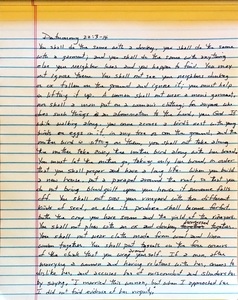
Deuteronomy 22:3-14
Synopsis Deuteronomy 22:3-14 3/6/2018
Moses established in the law that people should wear the clothes appropriate to their gender. As an extension of this principle, Moses taught that people should avoid mixtures that have as their intent, the disguising of something’s true character. So, he forbad mixing wool and linen fabric, different kinds of seeds in a field, or unequally yoked animals.
Additionally, he forbade harvesting two generations of animals at the same time. A hunter could take the off-spring or the parent, but not both because this thwarted the animals achieving their purpose in reproduction.
Letting Things Exist in Their Purpose
It’s the purpose for which a thing is made that matters. That’s seems to be God’s view anyway. Our post-modern tendency is to think of it in exactly opposite terms. As long as we know how to manipulate a thing, we should be free to do whatever we want to it.
Authenticity
I have this tendency to want to make Jesus relevant to the world – to mix the experience of Jesus with the best this world has to offer. It’s disingenuous. It’s dangerous. And it doesn’t work.
That’s not to say Jesus doesn’t speak into culture or our contemporary circumstances. He does to be sure. But this word comes by the Holy Spirit to a faithful heart. It’s a natural consequence of a relationship between persons – human and divine. It’s authentic.
But God is determined to be more than a set of principles that can be co-opted by clever post-modern people. If I come to Jesus wanting nothing but a self-help program, then I stand in danger of everything I thought I wanted blowing-up in my face. I could lose both my hope for something larger in this life and the possibility of heaven.
Likewise, no one pours new wine into old wineskins. Otherwise, the new wine will burst the skins, and it will be spilled, and the skins will be ruined. Luke 5:33
